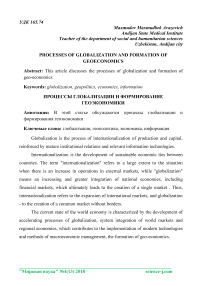Processes of globalization and formation of geoeconomics
Автор: Maxmudov M.A.
Журнал: Мировая наука @science-j
Рубрика: Основной раздел
Статья в выпуске: 4 (13), 2018 года.
Бесплатный доступ
This article discusses the processes of globalization and formation of geo-economics.
Globalization, geopolitics, economics, information
Короткий адрес: https://sciup.org/140289138
IDR: 140289138
Текст научной статьи Processes of globalization and formation of geoeconomics
Globalization is the process of internationalization of production and capital, reinforced by mature institutional relations and relevant information technologies.
Internationalization is the development of sustainable economic ties between countries. The term "internationalization" refers to a large extent to the situation when there is an increase in operations in external markets, while "globalization" means an increasing and greater integration of national economies, including financial markets, which ultimately leads to the creation of a single market . Thus, internationalization refers to the expansion of international markets, and globalization - to the creation of a common market without borders.
The current state of the world economy is characterized by the development of accelerating processes of globalization, system integration of world markets and regional economies, which contributes to the implementation of modern technologies and methods of macroeconomic management, the formation of geo-economics.
The globalization of the world economy is characterized, firstly, by the exit of interests of national economic entities beyond the state borders in the form of expanding the scope of activities of transnational structures on a world scale.
Secondly, the emergence of national economic problems on the global world level, which requires the mobilization of global resources for their solution.
Thirdly, the development of the economic situation in the leading countries has an impact on other states
Fourth, globalization requires coordinating national, economic and financial policies on a global scale, and dictates the need for a single world economic development.
The fruits of globalization are mostly developed countries. The countries of the rest of the world, to a lesser extent involved in world economic relations, in many cases remain "out of the way" of world scientific, technological and socio-economic progress.
The internationalization of production is inextricably linked with the transition of the international division of labor from partial to individual. The general division of labor is based on the specialization of spheres of social production, partial - on the subject specialization of individual industries, and the individual - on the sub-level, operational specialization of individual production units.
Since the 30-ies. XX century. the dominant form of the social division of labor is the sub-branch and operational specialization of the individual division of labor. For national borders, a single division of labor has emerged with the development of TNCs, which have become one of the most important subjects of international economic relations.
TNCs (transnational corporations) are enterprises (financial and industrial associations) that own or control production or service complexes located outside the country in which these corporations are based, having an extensive network of branches and offices in different countries and occupying a leading position in production and sale of a particular product.
TNCs have several advantages over national enterprises: the resource of one enterprise acts as a factor for another; technology is developed in one country, and applied in another; management of foreign enterprises is carried out from one center; parent companies finance branches; there are profitable contacts with other enterprises.
The role of TNCs. TNCs transformed the world economy into international production, ensured the development of scientific and technical progress in all its areas: technical level and quality of products; production efficiency; improvement of forms of management, management of enterprises. The formation of TNCs is inseparable from the interstate capital transfer. Creation of branches, subsidiaries, representative offices, joint ventures - this is foreign direct investment.
Transnationalization is a process of intertwining the economies of different countries, thanks to the activities of corporations to acquire enterprises in other countries, the establishment of foreign affiliates working for TNCs within the framework of specialization and cooperation.
Список литературы Processes of globalization and formation of geoeconomics
- Сохадалиев А. М. СОЦИАЛЬНЫЕ И ПРАВОВЫЕ АСПЕКТЫ РАЗВИТИЯ ЭКОНОМИКУ УЗБЕКИСТАНА //Экономика и социум. - 2017. - №. 4. - С. 1301-1304.
- Alexey Kireev. International Economics. Part one. Moscow. International relationships. 2000
- Scientific and Practical Journal The market, money and credit, 12/2012.
- World economy. O.V. Kornienko. M: Peter. 2010.


